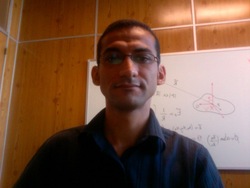Edivaldo Moura Santos grew up in the countryside of the state of São Paulo, Brazil. The son of sharecroppers who worked on plantations in the region, Edivaldo discovered a love for physics in his first year of high school in the small town of Itupeva. It led him to work hard and pursue a bachelor’s and then a Ph.D. in physics, and then to teach students at the Universidade Federal do Rio de Janeiro. Last year, Edivaldo joined the pilot of the Wikipedia Education Program in Brazil, and he’s happy to see his students enhance the information available about physics on the Portuguese Wikipedia.

Edivaldo’s students in his undergraduate Electromagnetism course had to write new or improve existing articles on the Portuguese Wikipedia related to their course readings. Campus Ambassador Vinicius Siqueira and Online Ambassadors Lechatjaune, Giro720, Sturm, and Olcyr helped students learn the basics of Wikipedia editing.
“I think the experience was unique,” Edivaldo says. “Not having the time and format constraints of standard written assignments gives you many more possibilities in the evaluation process. For example, having to write an encyclopedic article, the students have to be able to organize and systematize ideas and concepts. And to be able to accomplish that goal, the physical concepts have to be cemented in their minds. I had much more profound discussions with some students during the semester up to the point they really understood what they would later write on the Wikipedia.”
Edivaldo was extremely pleased with the student engagement and student learning that arose from the Wikipedia assignment.
“In a specific example, one of the articles was about the idea of electrical charge conservation,” he says. “The modern view of conservation laws in physics is totally based on the concept of symmetries and such a view is seldom discussed in a first course of Electromagnetism. The student responsible for that article, however, decided to read about topics beyond the course, such as analytical mechanics and quantum field theory. I was very happy with the final result.”
A key outcome for Edivaldo is that students are forced outside of the traditional way of learning in Brazil, where evaluation of student work is limited to written exams. While he acknowledges that exams have their place — physicists, he says, do have to be good at math — he feels that exams measure students’ ability to memorize key facts rather than truly understanding the concepts. When students had to write Wikipedia articles on topics, he says, they are forced to truly learn the concepts behind the formulas. And, of course, they improve the availability of free knowledge, spreading the wealth of information available to others interested in learning about physics.
“I discuss some physical concepts with students in more detail, and make them reflect on the definitions, theorems, and experiments that ended up in their articles,” he says. “My favorite part of doing a Wikipedia assignment is seeing students improving the content of the Portuguese Wikipedia and learning a bit of physics at the same time.”

Can you help us translate this article?
In order for this article to reach as many people as possible we would like your help. Can you translate this article to get the message out?
Start translation